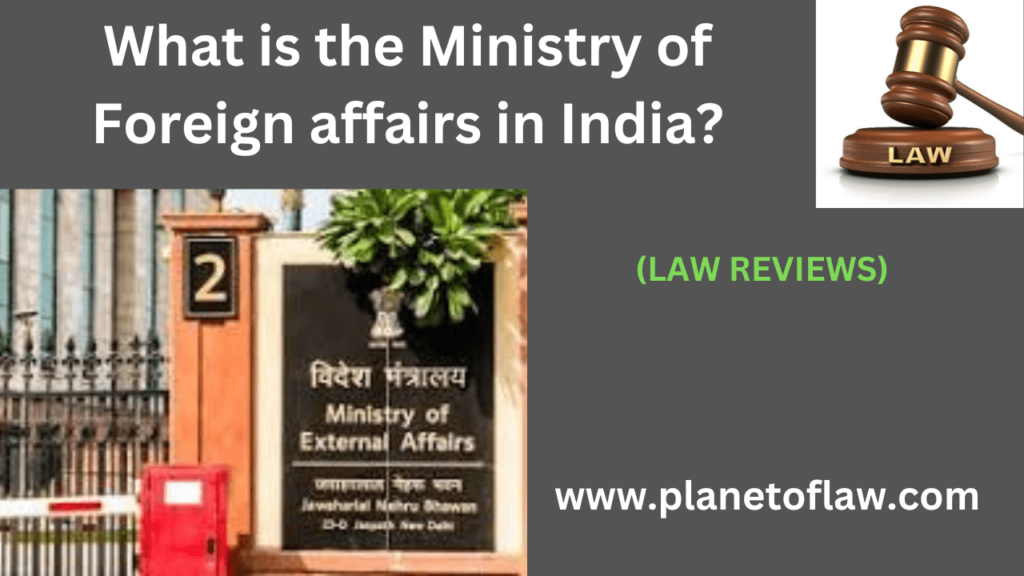Introduction –
What is the Ministry of Foreign affairs in India?
The Ministry of External Affairs (MEA) is the government agency responsible for the conduct of foreign relations of India. It is also known as the Foreign Ministry. The Ministry is headed by the Minister of External Affairs, who is a senior member of the Cabinet in the Government of India.
The primary functions of the Ministry of External Affairs include formulating and implementing the foreign policy of India, maintaining diplomatic relations with other countries, representing India in international organizations, and protecting the interests of Indian citizens abroad. The ministry plays a crucial role in managing India’s diplomatic initiatives, promoting economic and cultural relations with other nations, and addressing various global issues.
The Foreign Secretary, who is the highest-ranking civil servant in the ministry, assists the Minister of External Affairs in the execution of the country’s foreign policy. The ministry also oversees a network of diplomatic missions, consulates, and high commissions around the world to facilitate communication and cooperation between India and other countries.
What is the Objective of Ministry of Foreign affairs in India?
The Ministry of External Affairs (MEA) in India has several key objectives:
- Formulation and Implementation of Foreign Policy: The MEA is responsible for formulating and implementing India’s foreign policy. This involves defining the country’s stance on various global issues, establishing diplomatic relationships, and participating in international forums to promote its interests.
- Diplomatic Relations: The ministry works to maintain and enhance diplomatic relations with other countries. This includes conducting bilateral and multilateral dialogues, negotiations, and fostering cooperation in areas such as trade, defense, and culture.
- Representation in International Organizations: The MEA represents India in various international organizations, such as the United Nations, World Trade Organization (WTO), and others. It actively engages in these forums to voice India’s perspectives, contribute to global discussions, and collaborate on international initiatives.
- Consular and Passport Services: The ministry provides consular services to Indian citizens abroad, including assistance during emergencies, issuing passports, and supporting Indian nationals in distress in foreign countries.
- Promotion of Indian Interests: The MEA works to protect and promote India’s national interests globally. This involves addressing issues related to trade, investment, security, and the well-being of Indian communities abroad.
- Crisis Management: The ministry is involved in crisis management situations, including natural disasters, political unrest, or other emergencies affecting Indian citizens abroad. It coordinates efforts to ensure the safety and well-being of Indian nationals in such situations.
- Cultural Diplomacy: The MEA engages in cultural diplomacy to promote India’s rich cultural heritage and enhance people-to-people ties with other nations. This includes organizing cultural events, supporting educational exchanges, and showcasing India’s diversity.
In summary, the objectives of the Ministry of External Affairs are centered around safeguarding and advancing India’s interests on the global stage through diplomatic means, fostering international cooperation, and providing assistance to Indian citizens abroad.
What is the history of Ministry of Foreign affairs in India?
The history of the Ministry of External Affairs (MEA) in India can be traced back to the pre-independence era when the conduct of foreign affairs was managed by the British colonial administration. After gaining independence in 1947, India established its own foreign ministry to handle diplomatic relations and represent the country on the international stage. Here is a brief overview of the history of the Ministry of External Affairs in India:
- Pre-Independence Era: Before independence, the British government managed the external affairs of India. The Secretary of State for India and the Viceroy were responsible for formulating and implementing policies related to India’s relations with other countries.
- Creation of the Ministry of External Affairs: After gaining independence on August 15, 1947, Jawaharlal Nehru, India’s first Prime Minister, assumed the additional charge of the External Affairs portfolio. The Ministry of External Affairs was formally established on August 2, 1947, and Nehru held the position of External Affairs Minister until 1964.
- Nehru’s Diplomacy: Jawaharlal Nehru played a significant role in shaping India’s foreign policy during its formative years. His approach was characterized by non-alignment, promoting peace, and fostering cooperation among newly independent nations.
- Expansion of Diplomatic Relations: In the initial years, India focused on expanding diplomatic relations with various countries and establishing itself as a leader in the non-aligned movement. India played a crucial role in global affairs and supported decolonization and anti-imperialist movements.
- Sino-Indian War and Indo-Pak Wars: The Ministry of External Affairs faced significant challenges during conflicts such as the Sino-Indian War in 1962 and the Indo-Pak wars in 1965 and 1971. These events had a profound impact on India’s foreign relations.
- Economic Reforms and Globalization: In the 1990s, India initiated economic reforms and embraced globalization. The Ministry of External Affairs played a crucial role in navigating the changing global landscape, fostering economic ties, and representing India’s interests in international trade and commerce.
- Post-Cold War Era: The end of the Cold War brought about shifts in global geopolitics. India adapted to these changes by engaging in strategic partnerships, participating in international organizations, and addressing emerging global challenges.
- 21st Century: In the 21st century, India’s foreign policy has focused on economic diplomacy, enhancing regional cooperation, and addressing global issues such as climate change and terrorism. The MEA continues to play a pivotal role in shaping and implementing India’s foreign policy objectives.
Throughout its history, the Ministry of External Affairs has evolved to meet the changing dynamics of the international system while steadfastly working to safeguard and promote India’s interests on the global stage.
How the Ministry of Foreign Affairs deal with International Laws?
The Ministry of External Affairs (MEA) in India, like foreign ministries in other countries, deals with international laws through a multifaceted approach. Here are the key ways in which the MEA engages with international laws:
- Formulation and Implementation of Policies: The MEA is involved in formulating India’s foreign policy, which includes defining the country’s stance on various international legal issues. This involves considering international laws and treaties while aligning policies with India’s national interests and values.
- Negotiation and Treaty-Making: The ministry actively engages in negotiations with other countries to establish bilateral and multilateral agreements and treaties. These agreements often address a wide range of issues, including trade, investment, defense, environment, and human rights. The negotiation process involves legal experts from the MEA who ensure that the proposed agreements comply with international laws and norms.
- Representation in International Fora: The MEA represents India in various international organizations and forums, such as the United Nations, where international laws are discussed, debated, and formulated. Indian diplomats work to articulate India’s positions on legal matters, contribute to the development of international norms, and ensure that the country’s interests are reflected in global legal frameworks.
- Compliance and Implementation: Once India becomes a party to international agreements, the MEA is responsible for ensuring that the country complies with its obligations under these treaties. This involves coordinating with relevant domestic agencies to implement the provisions of international laws within the national legal framework.
- Legal Advice and Expertise: The MEA has a legal division comprising legal experts who provide advice on international legal matters. These experts analyze the legal implications of various issues, interpret international treaties, and guide policymakers on legal aspects related to foreign relations.
- Dispute Resolution: In cases where disputes arise with other countries, the MEA may be involved in diplomatic efforts to resolve conflicts peacefully. If disputes involve legal matters, the ministry works to find solutions within the framework of international law and may resort to international dispute resolution mechanisms.
- Human Rights and International Law: The MEA also plays a role in addressing human rights issues from an international law perspective. It engages in discussions and collaborations on global human rights standards, advocates for India’s positions, and participates in international initiatives to promote human rights.
In summary, the Ministry of External Affairs engages with international laws by incorporating them into foreign policy formulation, negotiating and entering into treaties, representing India in international forums, ensuring compliance with legal obligations, providing legal expertise, and addressing legal aspects of international relations and disputes. This comprehensive approach reflects the ministry’s commitment to upholding and navigating the complexities of international law in the context of India’s foreign relations.

